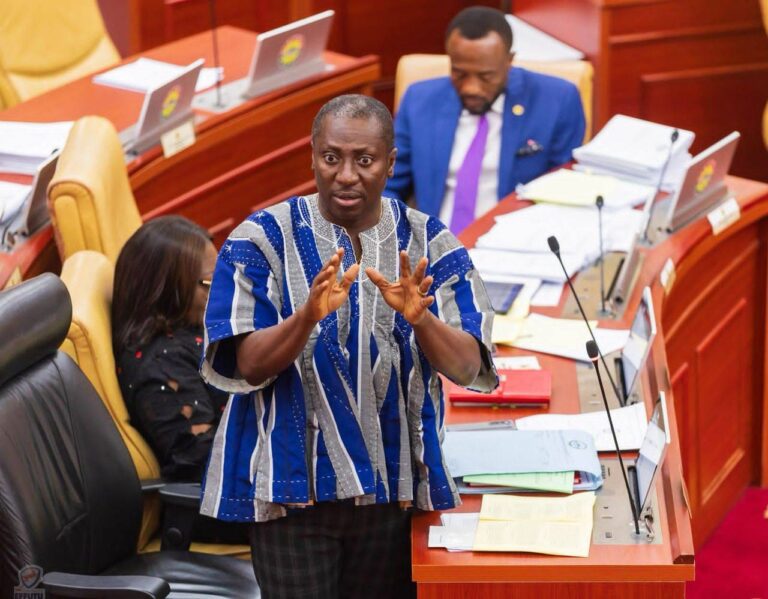Members of the Minority Caucus in Parliament who serve on the Appointments Committee have voted against all seven Appeal Court judges nominated by President John Mahama to be vetted and approved as justices to the Supreme Court.
Committee Chairman, First Deputy Speaker of Parliament, Bernard Ahiafor, in presenting the Committee’s report on the vetted seven nominees revealed that they had to be passed by a majority decision because the National Democratic Congress (NDC) Parliamentarians on the Committee voted for the nominees.
Parliament went ahead and approved the nomination of all seven justices for appointment to the Supreme Court but that was after a protracted heated opposition by the Minority side of the House.
The seven approved nominees are: Justice Janapare Bartels-Kodwo, Justice Hafisata Amaleboba, Justice Sir Dennis Dominic Adjei, Justice Gbiel Simon Suurbaareh, Justice Senyo Dzamefe, Justice Kweku Tawiah Ackaah-Boafo and Justice Philip Bright Mensah.
According to the Minority Caucus, they do not doubt the competences of the seven Justices and they fully agree all seven are qualified and fit for appointment to the Supreme Court.
The reservation and objection, the Minority explained, had to do with what they describe as a contradictory stance by the appointing authority and the double standards of the NDC Parliamentarians about nominations to the Supreme Court.
Even before the Committee report was tabled, Minority Leader, Osahen Afenyo-Markin, put up a strong opposition urging the Speaker to disallow it from being laid.
“why are they in a hurry? Is there something they know that I do not know? Mr. Speaker, it is a 137-page report and it is now being distributed to Members. Even on the Majority side, I don’t think they all have received copies and even if they have, I don’t think they have all read it so let us postpone this and wait till Thursday”, Afenyo-Markin argued but the Speaker ruled the report should be laid.
Even before the vetting of the seven nominated Justices, Afenyo-Markin, had officially made known the reasons his side of the House were against the nomination.
Osahen Afenyo-Markin suggested that the nomination of seven justices to the Supreme Court soon after the Chief Justice has been suspended appears to be more of institutional capture of the Judiciary rather than the routine filling of vacancies.
“We convene whilst our Chief Justice sits suspended through procedurally questionable processes under Articles 146 and 296. An executive that suspends one Chief Justice whilst installing seven new justices is not filling vacancies—it is reshaping the constitutional order. The appearance of institutional capture is inevitable and constitutionally catastrophic.
“The Supreme Court has abdicated its constitutional duty, repeatedly refusing to intervene when fundamental principles of natural justice face systematic violation. This institutional cowardice is constitutionally inexcusable. You will inherit a Court that retreated into comfortable silence when courage was demanded”, the Minority Leader noted in his opening remarks at the commencement of the vetting of the said seven justices to the Supreme Court upon Parliamentary approval.
His comments did not go without a rebuttal from the Majority Leader, Mahama Ayariga who opined that what Afenyo-Markin had said and the forum it was said were both inappropriate.
“This is not the appropriate platform to question the process surrounding the suspension of Justice Getrude Torkornoo …The process has been followed diligently, and even legal attempts to challenge it in the Supreme Court have failed”, Ayariga noted
According to Afenyo-Markin, the NDC led Government has been hypocritical in its position on the nomination of justices to the supreme court.
He explained: “The same NDC that relentlessly opposed Justice Sophia Bernasko Essah and Professor Richard Frimpong Oppong’s nominations under President Akufo-Addo—crying that the Court was “bloated”—now presents seven nominees simultaneously. Where was their concern about court size then? This gross dishonesty and rank opportunism insults our intelligence and constitutional processes.
“When two very qualified justices sought appointment, the NDC screamed about judicial bloat. Now, with seven nominees, they discover urgent constitutional necessity. Such breathtaking inconsistency exposes an administration driven by political calculation, not constitutional principle.”
The Minority Leader called on the nominees to be fair and firm in their line of duty if and when they are approved to the Supreme Court bench.
“To our nominees: you seek to join an institution whose legitimacy rests on public confidence in your constitutional fidelity. You must become guardians of our fundamental law, not instruments of executive convenience. The Supreme Court’s authority derives from moral standing, not political alignment.
“True judicial independence requires constitutional courage—deciding cases on law and precedent, not political preference. It means protecting minority rights against majoritarian excess. It means sometimes disappointing those who appointed you because the Constitution demands nothing less”, Afenyo-Markin noted.

